Theologian Peter O’Brien has written some of the best-reviewed New Testament commentaries in some of the most prestigious series in print today. His commentaries have been called magisterial and are frequently ranked as the best in their subject area.
They are praised for their superior Greek exegesis, conservative theology, and helpfulness to pastors and Bible teachers. O’Brien’s commentaries show mastery-level expertise in their respective subject areas and relevance to the modern day in their reflections and application suggestions.
Please see the video I made on this topic at the end of the article.
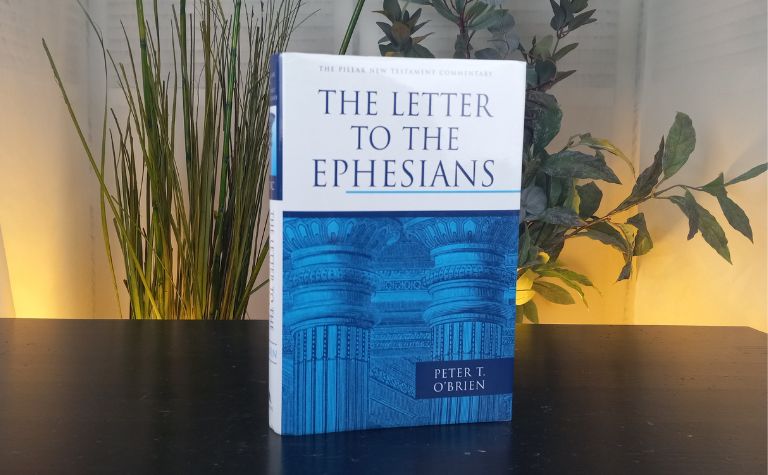
O’Briens Publishers No Longer Sell His Books
O’Brien wrote Colossians-Philemon in the Word Biblical Commentary (WBC) series, Philippians in the New International Greek Testament Commentary (NIGTC) series, and Hebrews in The Pillar New Testament Commentary (PNTC) series.
Yet O’Brien’s publishing partners, which include some of the largest and most influential in the industry like Eerdmans, InterVarsity Press, and Zondervan, no longer sell his books and commentaries.
Commentary volumes go out of print for a variety of reasons. Sometimes a new or revised edition of a particular volume gets published (or soon will be), so the first volume is discontinued.
Other times, volumes go out of print because it may no longer be cost-effective to continue to publish it, especially if it is older and in the public domain and the text can be found in full online.
However, these are not why O’Brien’s commentaries are no longer published.
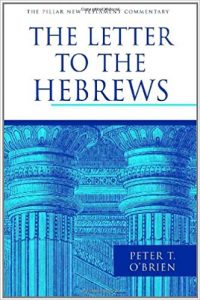
Who Is Theologian Peter O’Brien?
O’Brien is an Anglican priest, theologian, and New Testament scholar from Australia. His theology can be described as Reformed and evangelical. After studying at Moore Theological College and the University of Manchester, he taught at Union Biblical Seminary in Yavatmal, India.
After his time at UBS, he returned to his alma mater, Moore Theological College, eventually becoming its Vice Principal.
In the year 2000, a collection of essays was published in his honor called, A Gospel for the Nations: Perspectives on Paul’s Mission: Essays Presented to Peter Thomas O’Brien on his Sixty-Fifth Birthday.
Contributing essayists included several notable scholars and commentary authors, including D.A. Carson, Andreas Köstenberger, Richard Longenecker, I. Howard Marshall, and Moisés Silva.
Also, see the Best Commentary on Every Book of the Bible on one chart.
Plagiarism Accusations Arise
Given the serious nature of the charge, combined with the long and influential ministry career of O’Brien, it would be wise to read the following account with discretion.
Proverbs 18:17 explains that every story has two sides: “The one who states his case first seems right until the other comes and examines him” (ESV).
Eerdman’s Investigation
In the summer of 2016, Dr. O’Brien was accused of plagiarizing sections of The Letter to the Hebrews in The Pillar New Testament Commentary series. Eerdmans, the publisher of this series, investigated the accusation and then released this statement:
| August 15, 2016 At the beginning of July 2016, Wm. B. Eerdmans Publishing Co. received allegations against one of its New Testament commentaries and immediately undertook a careful investigation. Eerdmans is now withdrawing that book and two others by the same author. Eerdmans editors compared the text of The Letter to the Hebrews (Pillar New Testament Commentary, 2010) with various secondary sources and submitted findings to external experts for verification. Summing up the findings, Editor-in-Chief James Ernest said, “Our own editors and our outside consultants agreed that what we found on the pages of this commentary runs afoul of commonly accepted standards with regard to the utilization and documentation of secondary sources. We agreed that the book could not be retained in print.” |
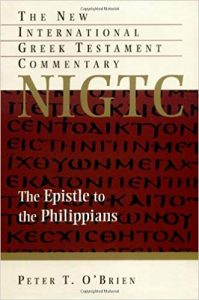
A second volume is discontinued
Examinations of O’Brien’s Letter to the Ephesians (PNTC) and Epistle to the Philippians (New International Greek Testament Commentary) found them less pervasively flawed but still unacceptable. After Eerdman’s announced their findings, O’Brien issued a statement.
“In the New Testament commentaries that I have written, although I have never deliberately misused the work of others, I now see that my work processes have been faulty and have generated clear-cut, but unintentional, plagiarism. For this, I apologize without reservation.”
| President and publisher Anita Eerdmans summed up the company’s stance as follows: “Eerdmans is steadfastly committed to the highest ethical standards in academic and business practice, and we apologize to all who are negatively affected by this situation. Our Bible commentary series, among the best of their kind, are authored and edited by the field’s top scholars. The strong measures we are taking in this case are meant to underscore our firm belief that our commentary program is, and must remain, solid.” Eerdmans is taking the following steps: ● Ceasing sales and pulling stock of all three volumes, placing them out of print. ● Offering credit to individuals and trade partners who have purchased the above three volumes. The credit offer expired May 31, 2017. ● Discussing best practices for quality control with press editors, series editors, and authors. [1] |
Later in the summer, another publisher made a similar decision.
Also, see Best Bible Commentary Series: Top 50 based on aggregate reviews.
Inter-Varsity Press Halts Publication of O’Brien’s Books
Inter-Varsity Press (IVP), which published two books written by O’Brien in the New Studies in Biblical Theology series, decided that they, too, would cease production on his texts.
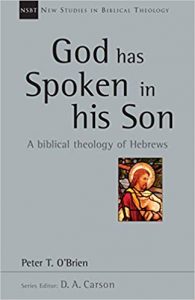
| “It is with sadness that we report that both God Has Spoken in His Son (2016) and Salvation to the Ends of the Earth (2001, co-authored with Andreas Kostenberger) were discovered to have the same problems regarding the use and proper documentation of secondary sources.” The originating publisher and investigator, Inter-Varsity Press (UK), has clearly stated that “the chapters in Salvation to the Ends of the Earth that were reviewed and found to have issues were those written by Peter O’Brien. The chapters by co-author Andreas Kostenberger are not under question.” We do not believe Dr. O’Brien intended to misuse secondary sources. And yet his research and writing practices have rendered clear instances of plagiarism. In the interest of maintaining high standards in writing, publishing, and business, Inter-Varsity Press is withdrawing both NSBT volumes from sale and shredding our remaining stock. [2] |
Zondervan Discovers Questionable Passages
In the Fall of 2016, a third publisher followed suit as Zondervan discontinued publishing Dr. O’Brien’s commentary on Colossians-Philemon in the Word Biblical Commentary series.
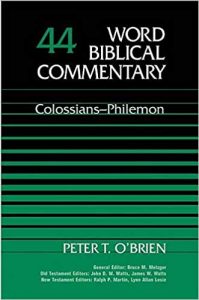
| November 4, 2016 In the summer of 2016, Zondervan Academic became aware of emerging concerns that one of its authors, Dr. Peter T. O’Brien, may not have followed commonly accepted standards for the use and documentation of secondary resources in Bible commentaries he had written. Consequently, we began a careful review of Dr. O’Brien’s commentary on Colossians and Philemon, volume 44 in the Word Biblical Commentary (WBC). It is with sadness and regret that we have concluded this volume does not follow commonly accepted standards for the use and documentation of secondary resources. Dr. O’Brien is revered by his colleagues in the academy and by his former students. His commentaries, including volume 44 in the WBC, have been used with great benefit by the thousands who have purchased them. While we have no reason to believe that Dr. O’Brien intentionally misused secondary resources, our commitment to high publishing standards leaves us no choice but to put volume 44 of the WBC out of print in both its print and digital formats and to destroy the remaining inventory. [3] |
The Context of the Plagiarism Accusations
Also, in the summer of 2016, Dr. Gerald Bray of Oak Hill Theological College provided some context for the accusations
The plagiarism charges arose in connection with the work of a South Korean scholar who had published 22 commentaries in seven years, “which naturally aroused suspicion.” Brays continues, “He was challenged and taken to court over alleged plagiarism, which is apparently rampant in these commentaries.”
“In his defense,” Bray explains, “the accused pulled Peter O’Brien’s commentary on Hebrews off the shelf and tried to prove that much of it had been lifted without proper acknowledgment from William Lane’s Word commentary on the same book.”
The complaint was passed to Eerdmans, who then launched its investigation in July. [4] Dr. Gray then makes three clarifications:
First, “nobody ever complained about Peter O’Brien directly. He was caught in the crossfire between two Koreans who were (and still are) arguing about something else.”
“Secondly, the identical sentences that I have seen are either statements of fact or quotations from the Bible. This does not mean that they were not copied, but whether it can really be called ‘plagiarism’ is at least open to question.”
“Thirdly, Peter O’Brien has been the victim of something that has nothing to do with him. That does not mean that he is without fault, of course, but those who would criticize him ought to bear that in mind.” [1]
Also, see the Study Bible Comparison Chart to compare over 50 volumes.
The Future of O’Brien’s Books
While O’Brien states he did not intentionally do anything wrong, and multiple publishers have expressed that sentiment as well, he did acknowledge certain unconventional processes and citation practices.
Commentary writers often read and take notes on thousands of pages from books and journals as they study and write.
If this process isn’t polished, detailed, and organized, it is easy to accidentally embed another person’s thoughts into one’s own, forgetting where the idea originated.
Sloppy doesn’t mean deceitful, but it may, under certain circumstances, be considered irresponsible.
It is unlikely that any major Christian publisher will ever again partner with O’Brien in the future.
Because self-publishing is easy and common, thanks largely to Amazon and the internet, perhaps O’Brien isn’t without opportunity, but to date, he has given no public indication that this is his intention.
His original research has been praised for decades by colleagues, reviewers, and readers, and it would be sad if such a gifted exegete never again published.
As for the commentaries, all the new stock publishers had were destroyed. New volumes (i.e., “old new stock”) can still be found on the secondary market. Used volumes can still be found on the secondary market as well, yet prices are likely to remain high — even into the hundreds of dollars as of this writing — due to limited supply.
Ministry Reflections
Should pastors and teachers continue to use O’Brien’s commentaries? The following thoughts are my own. I offer them simply as a fellow pilgrim. They are not intended to be the “final word” on the subject.
Should pastors and teachers continue to use O’Brien’s commentaries? I have wrestled with this question since I first learned of the accusations. Admittedly, I have a commentary of O’Brien’s on my shelf, and as of this writing, I do not intend to get rid of it.
Yet I am unsure if, or when, I will ever again use it. At the moment, I am content to just let it sit and collect dust as I stew over this story.
On my shelf, I also have a book from a pastor who resigned from a church for certain improprieties and another book from a professor who, perhaps similar to O’Brien, didn’t properly cite another researcher’s work and also had his book pulled by his publisher.
Do I get rid of those books? Where do I draw the line? In my view, the Christian publishers made the right decision. They must protect the integrity of their products.
Simultaneously, I believe O’Brien, his publishers, and his colleague (Bray) when they state that the mistakes were not intentional.
Still, there is great danger if the commentary user credits O’Brien in a sermon, lecture, paper, or book, for the material found in a publication that bears his name that is not his own original research but another’s.
In the end, it is a challenging matter for all involved: O’Brien, the authors whose work he should have more precisely cited, the publishers, and the readers who will miss out on O’Brien’s original research.
May God bring good from this difficult situation.
Also, see a list of the Best Bible Commentary Apps for more.
See Peter O’Brien’s books on Amazon (link uses exact ISBN):
Pillar New Testament Commentaries: The Letter to the Hebrews
New International Greek Testament Commentary: The Epistle to the Philippians
Word Biblical Commentary: Colossians-Philemon
Sources:
Eerdman’s statement on Peter O’Brien (accessed May 17, 2018)
IVP’s statement on Peter O’Brien via Frontline Media (accessed May 17, 2018)
Zondervan’s statement on Peter O’Brien (accessed May 17, 2018)
Anglican Link article on Peter O’Brien (accessed May 17, 2018)
Related Questions
Whole Bible commentaries will help you understand every passage of Scripture better. If Bible commentaries on single books are like studying individual trees, whole-Bible commentaries will help you...
With so many Bible commentary series available today, many people want to know which ones are best. There is a wide variety of commentary series today because readers have various purposes for using...
